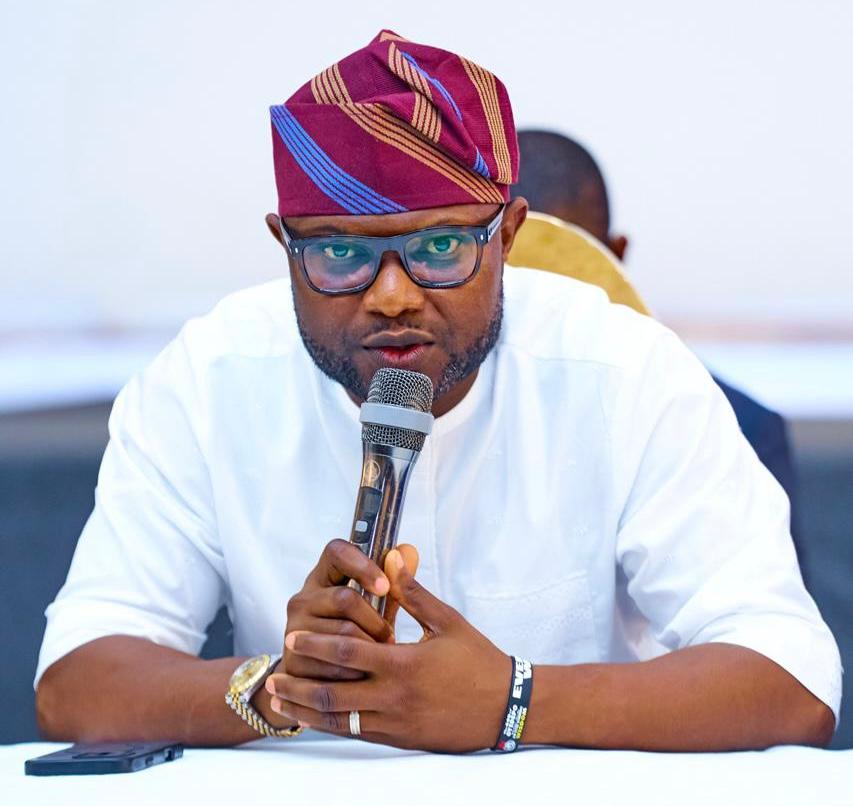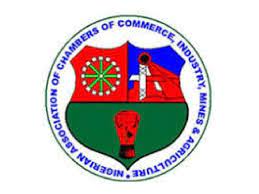The Nigerian Association of Chambers of Commerce, Industry, Mines and Agriculture (NACCIMA) has drawn that attention of the Federal Government on socio-economic matters of interest to the Association, in particular, and the private sector, in general and proffered suggestions on how to engineer the economy for growth and foster an investor – friendly environment.
The National President, Nigerian Association of Chambers of Commerce, Industry, Mines and Agriculture (NACCIMA) Ide J. C. Udeagbala, made the position of the Association known during a media parley held in Lagos.
Udeagbala, while citing the latest data from the National Bureau of Statistics, (NBS), noted that the Nigerian economy slowed down slightly from a 5.01% percent growth in the second quarter of 2021 to a 4.03% growth in the third quarter, stressing that while this is somewhat reflective of the global economic outlook which expects that economic recovery will be slow amid continued evolution of COVID-19 variants, diminished policy support, and lingering supply bottlenecks,
The National President, NACCIMA stated that it is the position of the Association that chances of accelerated recovery in Nigeria will be hindered by continuous institutional and infrastructural deficiencies that continue to plague the Nigerian economy.
Speaking on inflation, he pointed out that inflation, measured on a Year-to-Year basis, first rose to double digits in February 2016 and has increased persistently (with a few dips here and there) to 15.63% as at December, 2021.
“We hope that recent reports of increasing hyper-inflation will not return us to the highest ever inflation rate of 18.17% as at March 2021,” he said.
Unemployment rate, he noted, as at the second quarter of 2020 reportedly stood at 33.3%, signifying that 22million were unemployed in a labour force estimated at 80million people.
In this vein, he said, the unemployment crisis with its security implications deserves urgent attention and a definitive resolution.
He disclosed that the Association has been working with the government and other private sector operators and stakeholders to provide jobs in order to reduce unemployment, and therefore, urged the government to liberalise the business environment to enable our members to do more.
The Association stated further that Nigeria’s total foreign debt, as at September 2021, stood at 38 billion US Dollars, an increase of around 150% from 15 billion US Dollars in September 2017, while domestic debt rose by 38% from 16 trillion Naira to 22 trillion Naira over the same period.
It posited a pro-debt argument that has been consistently put forward that Nigeria’s public debt is relatively sustainable at 25% of its GDP, stressing that it is now generally accepted that the current levels of debt service payments are considerably high and unsustainable given dwindling government revenues.
“NACCIMA, once again counsels all levels of government, especially the Legislative and the Executive branches to consider other sources of funding, such as a preference for an increased tax base over increased taxes, and leveraging public-private-partnerships for tax credits spread over time,” the National President said.
Speaking with regards to foreign trade, the National President stated that data as at the end of the third quarter of 2021 shows persistence in Nigeria’s negative terms of trade which stood at NGN8.8 trillion, which is reflective of total exports worth NGN13.1trillion against NGN21.9 trillion in total imports.
According to the Association, “It is pertinent to note that such huge deficits have been rare occurrences in the history of our country’s terms of trade.Other negative terms of trade have been NGN2.2 trillion in 2015; NGN895 billion in 2016, NGN637 billion in 2019; and NGN8.1 trillion in 2020.”
The Association demanded that something drastic should be done to reverse this trend, and as they struggle to come to grips with this new reality, adding that the private sector acknowledges the increased pressure on the government to generate foreign exchange and shore up foreign reserves.
The Association added, “It is noteworthy that one of government policies to achieve this has been through the management of foreign exchange policies. Despite this, we have witnessed the devaluation of the Naira against the US Dollar, an exchange rate that is officially NGN415 to 1USD but about N585 to the Dollar in the unofficial market. This has come with consequences of increased costs of production of raw materials and consumables.”
Consequently, NACCIMA stated that as the voice of Nigerian businesses, they counselled the government to look to non-traditional sources of foreign exchange such as foreign direct investment and remittances from the Nigerian diaspora.
Udeagbala, explained that the rise of remote work and the huge demand for technology products have witnessed explosive growth in Nigeria’s startup ecosystem; hence the group wants the government to support this sector with the right policy environment, as it has the potential to be one of the highest sources of foreign exchange for the country.
NACCIMA National President, however, applauded the Federal Government of Nigeria and the National Assembly for ensuring the prompt passage of the National Budget within a timeframe that ensures its execution within a January to December budget cycle.
He stated that the Association noted with concern, however, the rising cost of governance with the passage of an Appropriation Bill of NGN17.1 trillion for 2022, more than doubles the budget for 2017 which stood at NGN7.4 trillion.
The Association also noted with concern, that with a recurrent expenditure budget of NGN6.9 trillion largely unmet by the estimated revenue of NGN4.1 trillion from crude oil, the government is turning to taxes and foreign debt to make up the deficit.
“We advocate once again for less dependence on debt financing and effective implementation of the budget to address the productivity challenges of the economy,” he counselled.
The Association opined that the most pragmatic solution to the problem of Nigeria’s widening infrastructure deficit is to seek a wider collaboration between the public and private sector as is evident in the success stories of the Presidential Executive Order 7 of 2019 on Road Infrastructure Development and Refurbishment Investment Tax Credit Scheme.
The Association stated, “We propose this strategy due to the fact that capital expenditure has fallen short in implementation in recent years. Only 60% of the NGN2.7 trillion budgeted for capital expenditure in 2020, and 55% of the N2.1trillion budgeted in 2019, were actually expended.
“We recommend for the massive expansion of Executive Order 7, which constitutes a non-interest loan by the private sector to the government towards infrastructure development, payable in future, in the form of tax credits.”
Speaking on the security situation in our country, the NACCIMA president noted that it demands urgent attention and determined action and call on the Federal Government, through its security agencies, to intensify efforts to counter and end the activities of kidnappers, bandits, terrorists, and other perpetrators of violence.
He lamented that insecurity dampens investor-confidence and labels the country as unsafe to do business, adding that such a situation does not present our country in good light to the rest of the world.
NACCIMA, he said, therefore calls on the relevant Ministries, Departments and Agencies (MDAs) of government, responsible for protecting lives and property, to work concertedly and intensify their efforts, especially as the Nation approaches the general elections.
He expressed NACCIMA’s readiness to partner with these MDAs using existing institutions such as the Police Community Relations Committee, (PCRC) to increase the effectiveness of security policies and measures.
NACCIMA also observes with dismay the unabating bottlenecks at the nation’s ports which have been hindering the quest to be a maritime hub in West Africa, adding that their members still encounter man-made delays in processing the clearance of their goods at the ports.
“We call for the opening of more sea ports in the country and the simplification of clearing procedures. In consonance with one of recommendations of the World Customs Organisation, we demand for the establishment of the Customs and Excise Appeal Tribunal to act as ombudsman in the resolution of disputes arising from imports and exports at the ports,” he emphasized.
NACCIMA frowned at the recently introduced e-invoicing and price verification policy of the Central Bank of Nigeria, which is set to commence on 1st February, 2022, and call on the CBN to postpone the date of commencement of this policy to enable our members get acquainted with the new dispensation.
The Association hinted that transition challenges will lead to chaos with immediate implementation and also requested the CBN to make the operation of these policies cost-friendly.
Now that Nigeria is on the verge of ‘make or mar’ decision threshold as another general election is fast approaching, the Association stated that government cannot afford to make mistakes in its organisation as a free and fair election will improve our rating in the comity of nations and result to more foreign direct investments.
The government, the Association said, should note that a violent – prone general election will rub off negatively on businesses and worsen investor – confidence in our economy.
They call on politicians and their supporters to play a fair game by putting the country first in their quest for victory at the polls.
The Association therefore harped on a need for wider stakeholder consultations in policy design and implementation; a cohesive strategy to ensure that policies do not cancel each other out; enthronement of policy changes that will improve their ease of doing business, and leveraging the private sector for infrastructure development and productivity.












